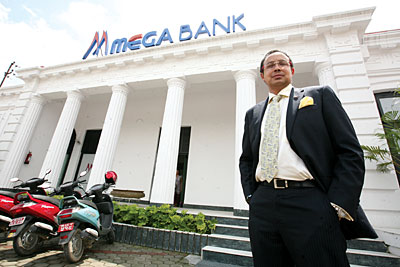 KIRAN PANDAY |
Some banks outgrow their CEOs. But Anil Shah is the kind who outgrows banks. In the last ten years he has been in and out of big banks like Standard Chartered and Nabil, and he now heads the newly established Mega Bank.
"I need change, and I need challenges," says Shah in his well-appointed new office in the former British Council building on Kantipath. With its rural banking focus, Mega offers Anil Shah both of these.
Mega has 1,220 middle-class Nepalis from all over the country as promoters, and 14 partners. This is a bank with attitude: its ideology is to promote 'financial inclusion' among the three fourths of Nepalis who are not banking at present. The promoters are divided into six clusters named after Nepal's mountains and they elect directors to the board.
"People often ask me who owns Mega Bank, and my answer is: the people," says Shah. "With so many promoters and partners no one can say 'it's mine'."
Mega Bank is zeroing in on small and medium-scale enterprises (SMEs) as part of its mission to promote self-sufficiency and job creation, and bring value-chain dynamics into the economy. It all sounds too goody-goody to be true, but Shah is deadly serious and says a country like Nepal must have this banking model.
"All the stakeholders � the bankers, development bankers, Rastra Bank, the World Bank, IMF� have to get together and decide once and for all what the strategic goal of the financial sector in Nepal should be. Is it only to make money and share dividends among shareholders, or is there a higher calling?" It is clear he has made up his mind about what the real answer is.
"It can't only be about profit," he continues, warming to his theme. "Of course you have to make money, but there has to be a nation-level goal of wealth creation by enlarging the pie through long-term economic growth. Just making money isn't enough for us."
Shah admits he came up with Mega Bank's slogan, which is now plastered across the country: 'Halo dekhi hydro samma' (from the plough to power). But no, he laughs, Mega isn't short for 'megawatts'.
It's clear he's been pitching his ideas to a lot of people in recent times. "It's not enough in Nepal today to say we will do what everyone else is doing but better," he explains. "That's for when everything is fine and there is political stability and economic growth. But if things are difficult, you have to carve out your own niche. You have to do something different that makes a difference."
Shah says the overwhelming response within a month of the bank's opening from small enterprises and agro-industries in the districts for loans proves that it is on the right track. He has just spoken to the Dairy Development Corporation about possibilities for expansion. This would fit the Mega model perfectly, he declares. Rural lending could finance an end-to-end value-chain to provide milk to the urban middle-class market.
Mega is nothing if not practical. "As the 28th bank in Nepal, we have no choice but to look at this model because the city is over-banked and three fourths of the market in the country has not been tapped," Shah explains.
Shah is one of a new breed of Nepali bankers who see a role beyond banking, even beyond the economy. The financial sector has to play a part in investment, economic growth, and job creation, not just for the sake of it, but to tap the full potential of the Nepali nation.
"As long as Nepalis are hungry we will never have stability," says Shah. "We now have political inclusion, but without economic inclusion there will be no future for this country."
Kunda Dixit
READ ALSO:
Bogged down
"Save for the future"
Who implements?, SUBRATH SHRESTHA


